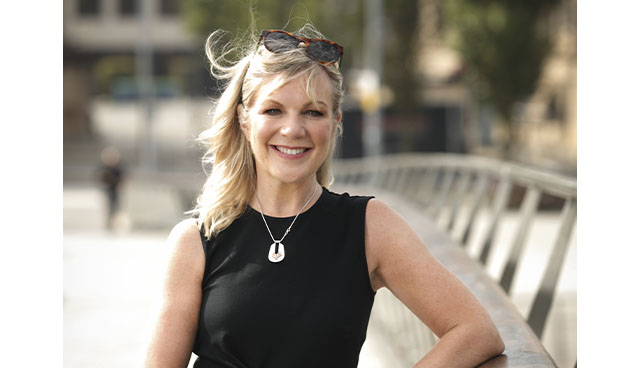
Former Belfast City Council Chief Executive and now CEO of the Government of Jersey, Suzanne Wylie, talks to David Whelan about her challenging new role, the importance of supporting female leaders and her formative years in Northern Ireland’s largest city.
As one of Northern Ireland’s most powerful public servants, up until very recently, Suzanne Wylie recognises that she is one of a select few women bucking the trend of gender inequality in senior leadership roles across the public sector.
Undoubtedly, she says, things are changing, as she offers examples of the recent appointment of Jayne Brady as the new Head of the Northern Ireland Civil Service, and the role of Grainia Long at the helm of the Northern Ireland Housing Executive. However, work must continue to enhance diversity across public life if decision-making is to deliver better outcomes for the whole of the population, she believes.
In 2014, Wylie became Belfast City Council’s first female Chief Executive, later in February 2022, she took up post as the Government of Jersey’s first female Chief Executive. In doing so, she possesses a self-awareness of the influence senior female leaders like herself can have on the aspirations of others.
“Given that we do not have enough women in public life, I think every woman in a position of leadership should see themselves as a role model,” she states.
“We all need to be thinking about how we can use our experience to help those who aspire to become leaders across all walks of life and how they can be supported to see what that looks and feels like.”
I think every woman in a position of leadership should see themselves as a role model.
The Chief Executive advocates for females across public life to be courageous in taking on new challenges and in being willing to take the next step.
In doing so, females can look upon Wylie’s own career as someone who has wilfully met the challenges of new roles head on. The Jersey Chief Executive has over 30 years of public service experience, having started her career as an environmental health officer in Belfast City Council in 1988. In 2010, Wylie became Director of Health and Environmental Services and in 2014, her appointment as Chief Executive coincided with sweeping reforms to local government.

Under her leadership, the Council has accomplished a number of feats, not least successfully managing the transition of some planning powers to local level, the 2017 publication and subsequent reviews of the city’s first community plan in the form of the Belfast Agenda and signing of the Belfast Region City Deal in 2021.
Wylie is quick to point out that she alone was not responsible for the Council’s success to date. To this end, she emphasises to aspirational leaders the importance surrounding yourself with support when taking on new roles.
“We often make too much of single-person leadership and in doing so I think we are setting people up to fail if their mindset is geared this way. At Belfast City Council, how we worked as a team was critical to the successes we delivered. We were on a joint mission.
“I was delighted to hear that John Walsh, a very important part of our team, has been appointed as the Council’s new CEO. As a friend and a former colleague, I know that John possesses an understanding of how the organisation works best and brings with him the skills and a fresh approach to best lead the organisation going forward and ultimately, deliver the best outcomes.”
Reflecting on her time at the helm of the Council, Wylie is cognisant that through her appointment, she was handed the responsibility of delivering a major step change at a time of local government reform.
“As a council, and I include the political side as well as the official sides of the Council, Belfast City Council was and continues to be very ambitious. Reform of local government presented so many opportunities, many of which we grasped. However, I think many more opportunities exist going forward.”
The former Chief Executive admits to meeting some frustrations in her time in charge. “We did not have all the tools that would have made it easier to deliver more quickly, for example, regeneration powers and responsibilities remained with central government. Additionally, the absence of a wider understanding of the role of Belfast continues to be a frustration. Belfast is important to the whole of Northern Ireland both economically and socially. That needs to be recognised. It is not, as is often portrayed ‘Belfast takes all’ and there needs to be a much more sophisticated conversation around the role of the city in delivering the right development and economic growth across Northern Ireland.”
Finally, describing relationships between the Civil Service, central government, and local government as “a work in progress”, Wylie believes that while challenges in this regard also exist in other jurisdictions, “in a small place like Northern Ireland it is even more important that we continue to develop those relationships”.
She adds: “All of the stakeholders are trying to deliver the same outcomes, those outcomes set out in the Programme for Government. Local government is responsible for delivering those outcomes at a local level and so that partnership approach is critical to assessing what is best delivered locally and what is better designated to a regional approach.”
Jersey
Wylie is adamant that she was not proactively searching for a completely new role when she was approached about the availability of the job as Chief Executive and Head of the Public Service in Jersey, however, acting on her own advice she offers to aspiring female leaders, she saw the new opportunity as one difficult to turn down.
Jersey, the largest of the Channel Islands between England and France, has introduced a new political system and in June 2022, will hold its first elections under the system, abolishing the role of senators and replacing them with 37 deputies elected across nine districts. To date, political parties aiming to debut in the election are still being formed.
Wylie is aware of the uniqueness of the situation on the island, which is a self-governing Crown Dependency, however, she also believes her time in Northern Ireland has equipped her with a range of skills which are suited to meeting the challenge.
Although boasting a population only one sixth of Belfast’s, Jersey has its own financial, legal, and judicial systems, as well as the power of self-determination. Despite being a crown dependency, with English as its first language and continuing use of sterling, the island is not part of the United Kingdom and is financially independent.
“The political situation is an interesting one and will require a lot of work post-election. In some ways it is very different from what Belfast City Council was but in others, there is a similarity in my role. With no party in ultimate majority, my role is to facilitate as much consensus as possible, so that decisions are taken for the best outcome for the people of the island,” she explains.
We often make too much of single-person leadership and in doing so I think we are setting people up to fail if their mindset is geared this way
“The political dynamic is similar from a public service point of view in that we will seek to provide the right policy options and investment options for the best outcomes. Interestingly, I can already see that in an island like Jersey, identity, heritage, culture, and traditions are incredibly important and that is something I aim to bring my experience to.”
Jersey’s economy is much different from that of Belfast’s, the island’s economy is dominated by a large financial services industry, generating around 40 per cent of its GVA, however, as Wylie explains, much like Northern Ireland, the island faces a skills challenge to meet its future ambitions, with a focus needed on attracting and retaining young people on the island.
She adds: “The large financial services industry is a different construct than that which exists in Belfast but there’s a similar opportunity to explore in diversifying the sector with much more integration of technology and growing the tech sector here in Jersey.”
Although when speaking, Wylie was only six weeks into the role, she expressed her excitement at not only getting to grips with the various challenges but also offering her insight and putting her stamp in public service delivery.
Concluding on whether she would be summoning inspiration from any female role models of her own in facing fresh challenges, she says: “I have always had role models, but I try to steer away from trying to emulate one single person. Instead, I often look to what skills and attributes a person had that I felt best resonated with me.
“I worked with Marie-Thérèse McGivern when she was Director of Development at Belfast City Council. She was a bundle of positive energy who pushed boundaries and I learnt a lot for her.
“However, it would be wrong of me to suggest that I take my learnings from females alone. One of my first bosses Brian Hanna, who went on to be the Council’s Chief Executive, taught me a lot. From a very early point in my career, Brian encouraged me to go beyond the job description, to try and test new things and importantly, he offered me support to do that.”
And she credits her immediate predecessor, Peter McNaney, with demonstrating the value of clarity of purpose and nurturing talent.
“I think it is also important to point out that you do not always need to be looking up as you build your skills and attributes. I was amazed by the innovation and motivation that came from all parts of our team in Belfast City Council. t“My advice to aspirational leaders is to add a mix of attributes to your own arsenal, rather than try and emulate an individual.”
|
Profile: Suzanne Wylie Suzanne Wylie began her career with Belfast City Council in 1988 as an environmental health officer, before becoming Director of Health and Environmental Services and the Council’s first female Chief Executive in 2014. She took up her post as Chief Executive and head of the Public Services for the State of Jersey in February 2022. A fan of eating out, Suzanne is an advocate of the culinary scene in Belfast and Jersey. A known-avid cycler, she admits that the hilly terrain of Jersey was influential in her recent switch to an electric bike. When not on two wheels, Suzanne likes to wind down with yoga or long walks. |





